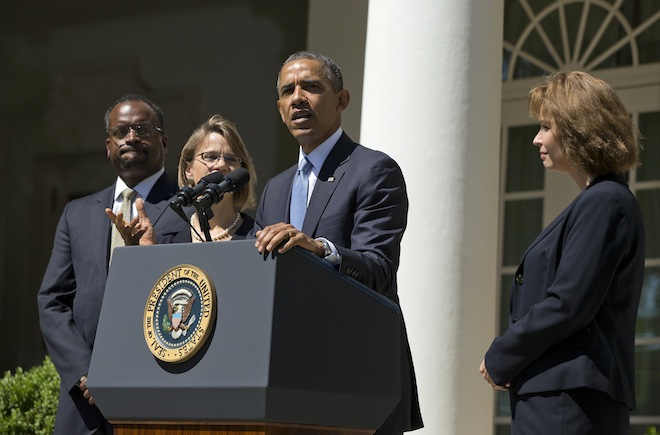Senate Democrats are poised to kick off the next big nuclear test on Thursday with a committee vote on one of President Obama’s nominees to the D.C. Circuit Court of Appeals, putting themselves on a collision course with Republicans over the filibuster.
The Judiciary Committee is poised to vote on the confirmation of Patricia Millett, who faced a hearing earlier this month. Given the Democratic majority on the panel, she’s expected to be approved. Republicans didn’t challenge her qualifications but held to their position that none of the three vacancies on the influential court ought to be filled.
Another Obama nominee to the court, Cornelia Pillard, also faced a hearing this month. Conservatives have labeled her extreme over her efforts to advance women’s equality. A hearing for the third nominee, Robert Wilkins, isn’t expected before the August recess. Senior Republicans are foreshadowing a mass filibuster of all three nominees.
“They’re the most qualified men and women who’ve come up, and I cannot think of any reason why such qualified men and women should be turned down,” Senate Judiciary Chairman Patrick Leahy (D-VT) told TPM on Tuesday. “So if they’re blocked you should be asking the Republicans because they’re the most qualified people in years — and far more qualified than the ones that the Republicans supported.”
That puts the two parties on a path to yet another confrontation over filibuster rules and the appropriate use of minority power. Since last fall, Democrats have repeatedly threatened to weaken the filibuster by a simple majority vote using the so-called constitutional option and bypassing standing rules of the Senate that require a two-thirds majority to change the rules.
Senate Majority Leader Harry Reid (D-NV) made clear after the last filibuster showdown — over executive branch nominees, which ended with Republicans folding — that he retains his right to go nuclear in the future if the GOP abuses the blocking tool.
The D.C. Circuit is often regarded as the country’s second most powerful court because it often has the final word over executive power decisions. It currently has eight active judges — four of whom were appointed by Democrats and four by Republicans. But it has six senior judges who also regularly hear cases, five of whom were appointed by GOP presidents. The court has invalidated numerous executive decisions by Obama on issues ranging from labor and environmental regulations to recess appointments.
The court is also a feeder to the Supreme Court, making the fight more politically volatile. Four out of nine sitting justices were plucked from the D.C. Circuit: Chief Justice John Roberts and Justices Antonin Scalia, Clarence Thomas and Ruth Bader Ginsburg.
As has been the case so far, detente is likelier than a proverbial mushroom cloud. In some ways the battle is tougher for both sides than the clash over executive nominees.
It’s tougher for Democrats because they’ll have a harder time rounding up 51 votes to eliminate the filibuster for lifetime-tenured judges, due in part to concerns of pro-choice senators about the kind of judges a future Republican president and majority could appoint with that power. Democrats forced the GOP to cave on seven cabinet and agency nominees by proving they had 51 votes to scrap the filibuster for executive picks. Without a credible threat to go nuclear on judges, it’s harder to get Republicans to back down.
“We’ll take those one at a time,” Reid said earlier this month, refraining from issuing the same nuclear option threat over the D.C. Circuit nominees. “Those are going through the process but we’ll see. … I think there’s a good feeling in the Senate.”
It’s tougher for Republicans because their aim is more political than substantive. They appreciate the advantage they enjoy as a result of the court’s conservative tilt and want to keep it that way. So they’re forced to argue, sometimes misleadingly, that these three judicial vacancies need not be filled. They contend that the D.C. court has a lower caseload than other circuit courts and have introduced legislation to eliminate three seats, a move that Democrats dismiss as hypocritical and ignorant of the complexity of its cases.
Asked Tuesday in the Capitol if he believes Obama’s three D.C. Circuit picks deserve up or down votes, No. 3 Republican Sen. John Thune (SD) told TPM, “Well, hopefully they’ll get votes.”
Thune’s spokeswoman AshLee Strong hedged his remark shortly afterward, saying that “Senator Thune believes that any qualified nominee deserves consideration in the Senate, but the Senate’s focus should be voting on judges for circuit courts across this country that have more vacancies and heavier caseloads than the D.C. Circuit.” That leaves room for a filibuster.
Complicating matters is that Republicans are still bitter about Democrats filibustering Miguel Estrada, President George W. Bush’s nominee to the D.C. Circuit who was being groomed for the Supreme Court, and forcing him to withdraw. They also note that Democrats attempted to block other Bush nominees to that court whom they slammed as extreme, although they caved and let three of them through after a GOP nuclear option threat in 2005.
Come what may, the fight isn’t likely to play out until members of Congress return to Washington in September. And one thing Democrats have going for them is that numerous rank-and-file Republican senators are fed up with their years-long strategy of obstructing Democratic initiatives as a matter of course. At least one Republican, Sen. John McCain (R-AZ), is on record saying the three nominees shouldn’t be filibustered.
“I think the objections [to the nominees] are completely unjustifiable,” Sen. Richard Blumenthal (D-CT) told TPM on Tuesday. “But I’m very hopeful that a new spirit is gaining traction.”






